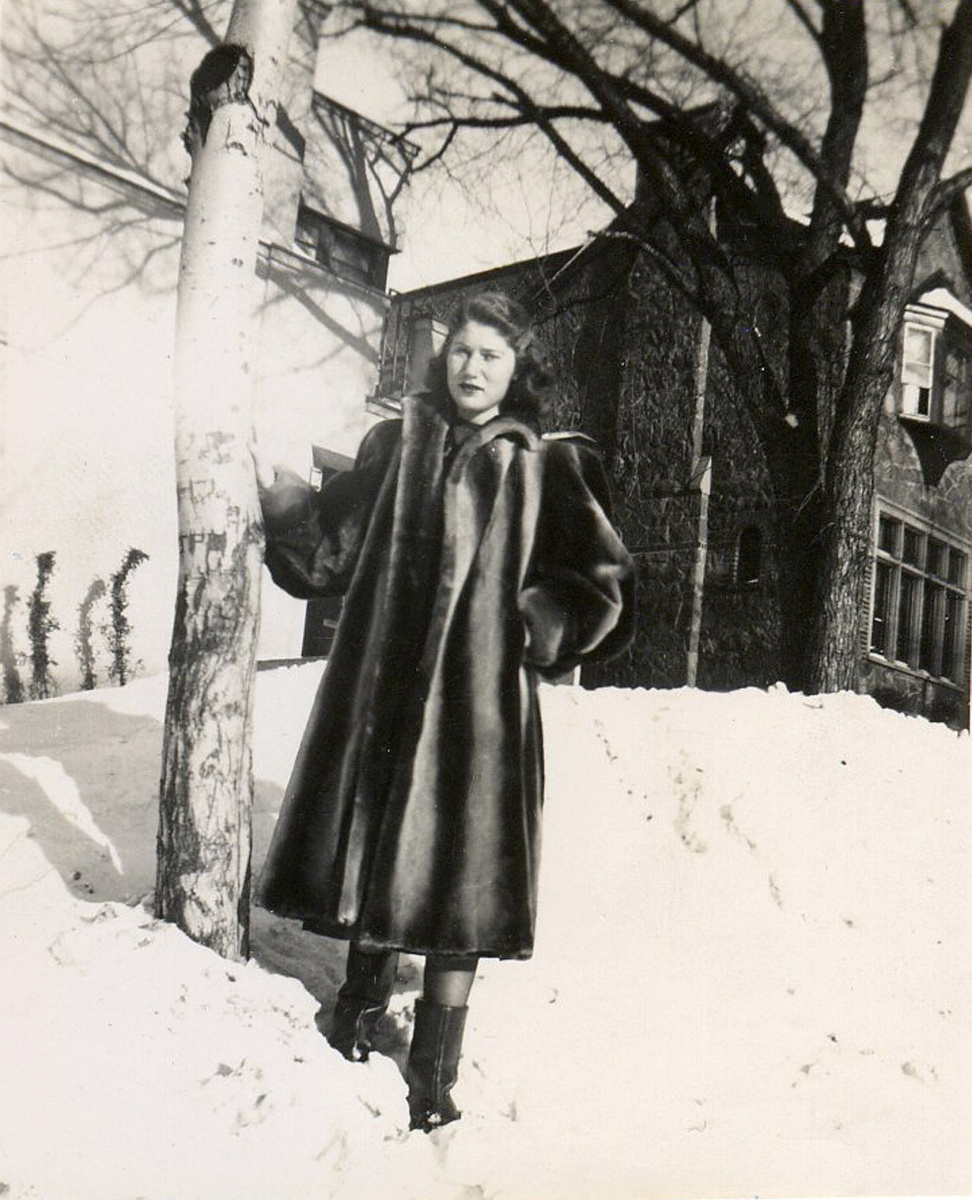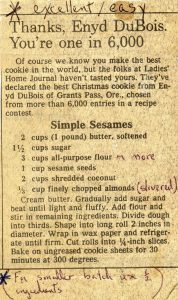In the year before my parents moved from their apartment in Philadelphia to an independent living facility in New York, my mother embarked on a frenzy of purging.
Unlike me, she has always been well-organized. She is less sentimental than I am, too, unlikely to save a menu from a special dinner 20 years earlier or a pretty woodblock stamp from a temple in Kyoto a lifetime ago.
But this was something different, and it went on for a while, so I got in the habit of combing through the trash can whenever I visited. One day, I pulled out black-and-white photographs of my mother and grandparents from the 1940s. Was this glamorous, young woman in a sumptuous fur coat really my mother? She looked pensive standing there in the snow. What was she thinking?
Another time, I rescued handwritten correspondence between my paternal grandfather and Louis Golding, a prolific, now mostly forgotten Jewish-British playwright and novelist. My grandmother had thought these letters worth saving for decades; they date back to the 1920s, and the stationery alone (fabulous period letterhead from “Hotel Manger – New York, The Largest Hotel in Times Square, 2000 Rooms”) seems worth saving. What was my mother thinking when she threw them out?
That same visit, or maybe it was a different one, she discarded – forsook? – her recipes. An enthusiastic and adventurous cook for many decades, Mom wouldn’t be making meals in her new home, which offered a communal dining room and a no-cook, no-cleanup lifestyle to its residents. The women who lived there had spent lifetimes cooking for husbands and children. Maybe, like my mother, they weren’t sorry to give it up.
“That was then. This is now,” my mother declared after she moved, serene and practical about life without boiling, broiling, browning or baking. She says that about a lot of things now.
MOVING ON
Most of Mom’s small collection of cookbooks had gone 10 years earlier when she and my dad moved from their house of 50 years, my childhood home, to the apartment. Dad wanted, fiercely, to stay put. Mom wanted to avoid burdening her children with a big house filled with the accumulation of years.
In preparation for this next move to New York (Mom ready, Dad morose), she distributed her few remaining cookbooks, and now she was emptying the file cabinet that throughout my childhood held folders of neatly labeled, annotated recipes: For Thanksgiving, For New Year’s Party, To Try … Recipe after recipe went into the trash, among them our Swiss neighbor’s nut torte (the neighbors themselves long since retired to Florida); our Iraqi friend’s rice pilaf, and her culinary journey, as described in an article in the Philadelphia Inquirer that mom had kept; a newish recipe for braised beef with sweet potatoes and apricots that my mother was lately keen on; and a yellowed newspaper clipping with a recipe for Simple Sesames, marked by what looked like a butter smudge.
I didn’t remember these cookies. She didn’t either (“No, I can’t remember. No”), though there were a few recipe notations in her distinctive cursive hand. Up top, she’d drawn a star and written her appraisal: “excellent/easy.” (“I graded it?” my mother asked later. “It must be good.”) Yes, it did sound good. I’d taken the clipping from the trash and stashed it in my bag. Back in Maine, I’d shoved it into my own bulging recipe folder (a mess!), where it stayed for several years, untried and forgotten – until this October.
October, when my dad, now 92, was unwell, and in and out of the hospital, each 2 a.m. ER visit more frightening than the one before.
He’s stable now, but he’s tired all the time. “Is this just what happens when you are getting old?” he asked his doctor. “Bob, you are not getting old,” the doctor answered. “You are old.”
I visited my parents twice in October, visits that were neither wholly excellent nor easy. The evening I returned from the second visit, tired, sad and disappointed in myself, I flipped through my recipe folder as I drank a cup of warm milk. This is what comfort looks like to a food writer. Was it merely chance that the recipe for Simple Sesames floated to the floor?
REMEMBRANCE OF COOKIES PAST
My mother didn’t know how to cook when she married my father in 1954. The family joke is that he taught her. In truth, she says she taught herself from cookbooks and, she thinks, asking others. “I didn’t learn to cook until I had to cook,” she told me when I asked her about that time recently, then assured me that she was unfazed by her new responsibilities as a new bride.
“I was just feeding him. And I knew his mother wasn’t a wonderful cook. He wasn’t brought up on gourmet food. It was just something to eat. It was just dinner. (Nanny) used to feed us and make me take the leftovers home. She was afraid I wasn’t feeding him well.”
Eventually, she fed him very well. My mom discovered she liked to cook. “I got into it. The creativeness. It wasn’t a chore.” Which was lucky, and formative, for me, the last of her four girls.

Thumbprint cookies are the first thing I ever remember cooking. My mother baked them every Christmas, a holiday we didn’t celebrate (we’re Jewish). My job was to make dents for the jam with my thumb. We also made spritz cookies with a press, Russian tea cakes, Scotch lace cookies and toffee squares. My older sisters jogged my memory of the particulars, and I jogged hers, when we tallied them up recently. We started with Scotch lace cookies (“I remember those. They had lots of holes”). But she didn’t recall the battered red tin that sat on the kitchen floor for weeks before Christmas, home to batches of cookies separated by wax paper until we’d assembled enough varieties to divvy up among viola teachers, piano teachers, guitar teachers, classroom teachers, neighbors and our own cookie-loving family of six.
Cookie baking was fun, but we girls had daily kitchen chores, too. The schedule was affixed to the refrigerator with a magnet. Every evening, someone was assigned to set the table and help mom make dinner; another daughter had to clear the table; a third had the dishes to wash – the most unpopular task; for years, I claimed I didn’t know how to wash pots. Daughter No. 4 got the night off.
When I asked her a few weeks ago, Mom said these chores were never meant to teach us to cook. “I was trying to teach you to pitch in and do your share,” she said. But whatever lesson she intended, she managed to nurture four cooks who are as happy in the kitchen as she was.

COLD TURKEY
Mom still likes to help in the kitchen. “I’ll be your sous chef,” she says, and she’ll happily peel carrots and chop celery under my direction. But cooking an entire meal or even an entire recipe has become too complicated. “Been there and done that,” Mom says. “I just stopped cold turkey when I came here, and I really don’t miss it.”
My mother turned 90 a week and a half ago. She eats differently than she used to. She claims to hate cucumbers, something she put in salad every night when I was growing up, scoring their skin with a fork to create a pretty pattern. She looks askance at my order of grain salad, which she proclaims “too healthy.” But I learned all my good eating habits from her. She orders soda with lunch in the communal dining room, though she never permitted it in our house unless we were sick – then we could have ginger ale. She claims to loathe oatmeal and denies that she ever made us eat it once a week. And Mom, who had a splendid, wolf-whistle-worthy figure – even after four barely spaced pregnancies – is often too thin now.
Mom’s love of cooking has diminished, probably disappeared. She lives so effortlessly in the here and now, something I have tried and failed to do myself for years, to be present.
It’s me who is sad. It’s me who misses, if not exactly her cooking – OK, that too, her stuffed cabbage, her chicken soup, her applesauce – but what I really miss is My Mom the Accomplished Cook. Also my mom the Girl Scout troop leader, my mom the tennis player, my mom the opera lover, my mom the foreign film fan, my mom the adept craftswoman, my mom the cultured reader, my mom at 40, 50, 60, 70, 80.
So three days after my most recent visit to New York, I soften some butter, plug in the mixer and find myself making Simple Sesames. Because I am sad, and tired, I screw up, mixing up cups and pounds of butter. When the dough refuses to come together and I scan the recipe and realize my mistake, I throw in an extra 1/2 cup of butter at the end and hope for the best.
When it comes to my parents, hoping for the best is a lot of what my sisters and I do these days. And we measure the best in smidgens and dashes – belting out a verse from “Camelot” with my dad, watching my mom’s face light up when we visit a pet cemetery together, sitting outside on a sunny day with a copy of the Wall Street Journal and trying to recite the names of the flowers that surround us.
I bring the cookies to work. Three colleagues ask for the recipe. These Simple Sesames are better than excellent, and if you are not distracted, they are easy to make, too.
Peggy Grodinsky can be contacted at 791-6453 or:
pgrodinsky@pressherald.com
Twitter: PGrodinsky

Comments are no longer available on this story